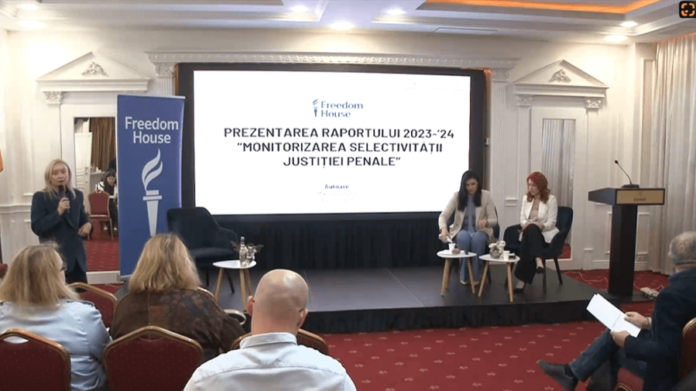On April 29, 2024, Freedom House released the third Criminal Justice Selectivity Monitoring Report (2023-2024). The Republic of Moldova conducted the report, adapting the methodology from the first two monitoring exercises in 2019 and 2021, with financial support from Freedom House. The report highlights a new type of influence on justice that can determine its selectivity – the influence of an interest group within justice connected to actors within the governmental arc.
During the monitoring period in 2023-2024, a total of 58 criminal cases underwent selection, with 28 at the judicial review stage and 30 at the prosecution stage. During the 12 months of monitoring, the 28 cases at the judicial examination stage underwent 347 court hearings. Of these, 146 hearings (42%) were postponed or did not take place.
“More than a third (39%) of the monitored court hearings in the period February 2023 – February 2024 took place in 5 cases and concerned three defendants: businessman Veaceslav Platon, former head of the Anticorruption Prosecutor’s Office Viorel Morari, and former President Igor Dodon. The report showed that non-political and criminalized individuals no longer join political parties or seek help from ruling parties to resolve their legal issues. (…)
The report shows several indications that the General Prosecutor’s Office, the PA, the PCCOCS, the NAC, and the courts have been exposed, at certain times, to undue influence from an interest group within the judiciary close to some government figures. The influence was observed both in the public communication of these institutions and of exponents of power close to the interest groups, and in the attitude and decisions of the prosecution body and the courts towards criminal cases of interest to the influence group about other similar criminal cases,” say the authors of the report, journalist Mariana Rata and Cristina Ciubotaru, master in private law.
Furthermore, the report indicates that during the monitoring period, every third high-profile case under surveillance involved allegations of illicit enrichment.
FOR THE MOST IMPORTANT NEWS, FOLLOW US ON TWITTER!
During this period, for the first time, the targeted majority of such cases were not judges and prosecutors (39%) but opposition politicians (61%). This development confirms the trends of electability of the judiciary in the interests of the government.
“Most cases of illicit enrichment tend to have a revenge angle, especially when there is no predicate crime generating such enrichment, and the subject of such an investigation is not among those most targeted by journalistic inquiries. In the context of the Republic of Moldova, where the volume of remittances from abroad continues to fuel the national economy, a large part of these come from sources that have no fiscal reflection. It is easy to question the origin of the wealth of practically any civil servant, depending on the existence of an interest in this regard and the insistence of the law enforcement authorities,” the authors note.


